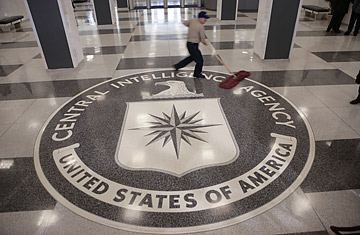
The logo of the U.S. Central Intelligence Agency is swept clean in the lobby of the CIA headquarters in Langley, Virginia.
(4 of 4)
Even then, better intelligence wouldn't be enough. In another set of proposals, the commission recommends that the U.S. expand its efforts to reach out to the Islamic world through more active public diplomacy and small-bore programs such as scholarships and cultural and educational exchanges. The trouble is that even as the U.S. tries to defuse the appeal of fanatics like bin Laden, its policies in Afghanistan, Iraq and the Middle East since Sept. 11 have inflamed some Muslims and almost surely driven some fence sitters into the camps of the extremists. "Right or wrong, it is simply a fact that American policy regarding the Israeli-Palestinian conflict and American actions in Iraq are dominant staples of popular commentary across the Arab and Muslim world," the panel writes. "Those choices must be integrated with America's message of opportunity to the Arab and Muslim world."
In the long run, making America and its allies safe again will require far broader changes than even the 9/11 panel was empowered to propose. In the meantime, the U.S. has little choice but to brace itself for the possibility of another strike. "We do not believe," the commissioners write in the report's conclusion, "that it is possible to defeat all terrorist attacks against Americans, every time and everywhere." In that sense, the 9/11 commission's legacy may ultimately be determined by how long the U.S. can deter the inevitable. --Reported by Timothy J. Burger; Massimo Calabresi; James Carney; Matthew Cooper; Bruce Crumley/Paris; Sarah Sturman Dale/Minneapolis; J.F.O. McAllister/London; Viveca Novak; Margot Roosevelt/Los Angeles; and Elaine Shannon and Mark Thompson/Washington
